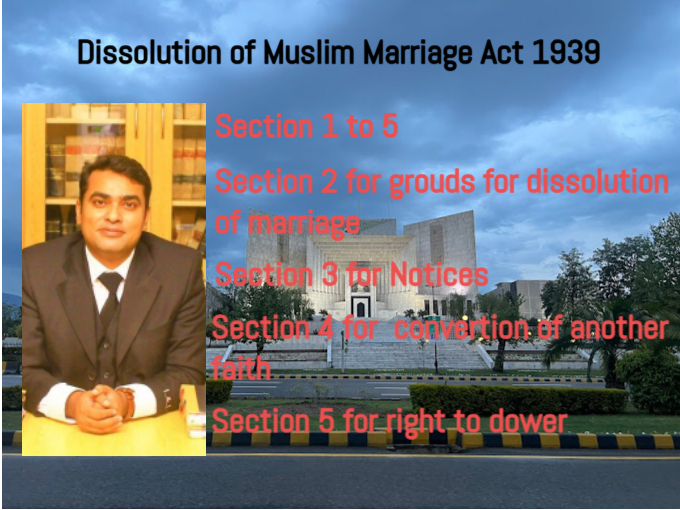Understanding the Dissolution of Marriage Act 1939 in Pakistan:
Understanding the Dissolution of Marriage in Pakistan. The introduction of the Dissolution of Marriage act 1939 .The key features of the Dissolution of Marriage in 1939 . Challenges Faced by Women in Availing Divorce Rights in Pakistan . Legal Reforms towards Improving Women's Rights of Divorce in Pakistan.
Muhammad Ali Mughal Family Law Consultant +923274554455
3/5/20254 min read
Introduction to Dissolution of Marriage in Pakistan
The concept of dissolution of marriage in Pakistan holds significant legal and social implications, especially within the context of Muslim communities. Historically, this act was legislated by legislative assembly pak-o-hind through British ruler 1939.
The legal framework governing the dissolution of marriage in Pakistan is heavily influenced by Islamic law, or Sharia, which provides specific guidelines regarding the conditions under which a marriage may be dissolved. The role of family, social norms, and religious tenets often add layers of complexity to the issue, which impacts individuals' decision-making processes when considering divorce.
This law was formulated to address the challenges faced by Muslim women seeking divorce, thereby providing them with a legal recourse that empowers them within a patriarchal society. The Act outlines specific grounds under which a woman may seek a divorce, offering a structured approach to what may otherwise be a tumultuous and emotionally charged process. By recognizing women's rights within the context of divorce, the Act not only promotes gender equity but also crystallizes the legal avenues available for addressing marital disputes.
In summary, the dissolution of marriage in Pakistan, particularly under the purview of Muslim marital laws, necessitates a thorough understanding of historical practices, religious contexts, and legal frameworks. The Dissolution of Muslim Marriages Act 1939 stands as a landmark law that endeavored to fortify women's rights, thus marking a significant evolution in the discourse surrounding divorce in the region.
Key feature of Dissolution of Muslim Marriages Act 1939
The Dissolution of Muslim Marriages Act 1939
Section 2 for Grounds for decree for dissolution of marriage:-
That the husband have not been known for a period of four years.
That the husband has neglected or has failed to provide for her maintenance for a period of two years.
That the husband has taken an additional wife in contravention of the provisions of the Muslim Family Laws Ordinance, 1961.
That the husband has been sentenced to imprisonment for a period of seven years or upwards.
That the husband has failed to perform his marital obligations for a period of three years.
That the husband was impotant at the time of the marriage and continues to be so.
That the husband has been insane for a period of two years or is suffering from leprosy or a virulent venereal disease.
That she, having been given in marriage by her father or other guardian before she attained the age of 16 years, (Provided that the marriage has not been consummated (rukhsati)).
That the lian ( Lian means where the husband has accused his wife of zina and the wife does not accept the accusation as true.)
That the husband treats her with cruelty, that is to say
habitually assaults her or makes her life miserable by cruelty of conduct even if such conduct does not amount to physical ill-treatment, or
associates with women of evil repute or leads an infamous life, or
attempts to force her to lead an immoral life, or
disposes of her property or prevents her exercising her legal rights over it, or
obstructs her in the observance of her religious profession or practice, or
if he has more wives than one, does not treat her equitably in accordance with the injunctions of the Quran.
on any other ground which is recognized as valid for the dissolution of marriages under Muslim law.
Challenges Faced by Women in Availing Divorce Rights in Pakistan
In Pakistan, after the dispute raised between husband and wife. The husband ended up the marriage contract by saying oral talaq to his wife ,which is compulsory require to adopt procedure under section 7 of THE MUSLIM FAMILY LAWS ORDINANCE, 1961. then after the wife adopt the procedure of dissolution of the marriage
Moreover, a considerable lack of legal awareness among women exacerbates the situation. Many women are unaware of their rights under the Dissolution of Muslim Marriages Act, leaving them ill-equipped to navigate the complexities of the legal system. This knowledge gap is often fueled by limited access to educational resources and legal literacy programs, which can empower women to understand their rights and the mechanisms available for divorce. Without proper guidance and information, women may find themselves lost in a system that is already challenging to maneuver.
we are living in the 3rd world country which was the colonized by the Great Britten .We are stuck between English laws and Islamic Laws. Systemic issues within the legal framework also play a crucial role in hindering women’s access to divorce rights. Beside of the rule of Federal Sharita court of Pakistan, our mulvies have revers rule in this part, this will make more complicated by issue fatwa that dissolution of marriage is against the Islam. Our Islamic mulvies have neither active participation in falderal Shariyat Court of Pakistan nor pass any amendment which is against the law.(it is fact )
Legal Reforms towards Improving Women's Rights of Divorce in Pakistan.
The dissolution of marriage in Pakistan, particularly under the framework of the Dissolution of Muslim Marriages Act 1939, highlights the pressing need for legal reforms that enhance women's rights during divorce proceedings. Despite the existence of this Act, many women face significant barriers when seeking justice, necessitating a multi-faceted approach to improve their rights and experiences in the realm of marriage dissolution.
Firstly, notice issued under section 3 of this Muslim act, which will be served at the address which is mention in nation identity card or nikah nama.(This reform for the inform the information for the dissolution of marriage towards the husband .
Secondly, the dower amount shall be with draw in both cases (muajal and ghar- muajal ( That reform is most closest definition of khula in Islam )


